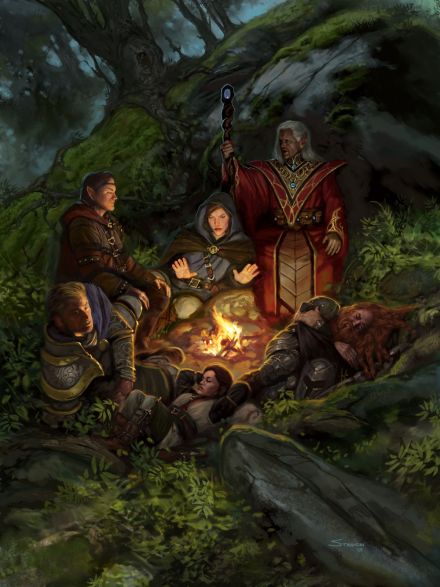Difference between revisions of "Character Race Relations"
Tao alexis (talk | contribs) |
|||
| (3 intermediate revisions by one other user not shown) | |||
| Line 1: | Line 1: | ||
| − | + | [[File:Race-relations-01.jpg|thumb|440px|]] | |
| + | '''Character race relations''' as described or codified in numerous fiction or D&D game books has no relevance in the game world described here. No specific template of attitude between one group towards another exists, because the circumstances of territory, trade, availability of goods, reliance due to diplomatic concerns and so on dictate allegiance, not racism. | ||
| + | __TOC__ | ||
| + | Intelligent species number in the hundreds, [[Humanoid|humanoids]] and [[Bestiary|other]], each contributing to the diverse array of societies that have taken root across the lands. Societies, even within the races themselves, vary significantly in size and nature, encompassing everything from minute pockets of habitation tucked away in [[Subterranean (range)|subterranean]] realms to vast, sprawling empires that stretch across continents. Between these extremes lie countless kingdoms, republics, principalities, and duchies, each establishing its territorial claims, often with neighboring regions and occasionally challenging these boundaries. | ||
| − | All these societies compete for land, | + | All these societies compete for land, [[Trade System|wealth]], military and [[Religion|religious]] superiority, the spread of their culture and in other less important ways. This competition produces a certain degree of antipathy; often, following an collection of violent historical incidents, outright hatred. |
| − | + | Only a fool would trust another person merely on the basis of race, or even because both of the same region — though naturally it happens, because the world is full of fools. It's worth remembering, however, that the 17th century is well before the rise of "nationalism." | |
| − | + | == Non-player Races == | |
| + | Therefore, as there are vast realms in the game world ruled over by orcish and goblinish peoples, and many other non-player character races besides, there remains the opportunity for well-meaning characters to venture into such places. It is always well to remember that foreign cultures are rife with expectations of temperament, religious qualms and a general distrust for strangers ... but this does not mean that a human party can't venture into a vast [[Hobgoblin|hobgoblin]] empire and be welcomed as friends or the bringers of news from the outside world. | ||
| − | + | ||
| + | See [[Player Characters]] | ||
| + | |||
| + | [[Category: Reviewed]] | ||
Latest revision as of 20:30, 31 October 2023
Character race relations as described or codified in numerous fiction or D&D game books has no relevance in the game world described here. No specific template of attitude between one group towards another exists, because the circumstances of territory, trade, availability of goods, reliance due to diplomatic concerns and so on dictate allegiance, not racism.
Contents
Intelligent species number in the hundreds, humanoids and other, each contributing to the diverse array of societies that have taken root across the lands. Societies, even within the races themselves, vary significantly in size and nature, encompassing everything from minute pockets of habitation tucked away in subterranean realms to vast, sprawling empires that stretch across continents. Between these extremes lie countless kingdoms, republics, principalities, and duchies, each establishing its territorial claims, often with neighboring regions and occasionally challenging these boundaries.
All these societies compete for land, wealth, military and religious superiority, the spread of their culture and in other less important ways. This competition produces a certain degree of antipathy; often, following an collection of violent historical incidents, outright hatred.
Only a fool would trust another person merely on the basis of race, or even because both of the same region — though naturally it happens, because the world is full of fools. It's worth remembering, however, that the 17th century is well before the rise of "nationalism."
Non-player Races
Therefore, as there are vast realms in the game world ruled over by orcish and goblinish peoples, and many other non-player character races besides, there remains the opportunity for well-meaning characters to venture into such places. It is always well to remember that foreign cultures are rife with expectations of temperament, religious qualms and a general distrust for strangers ... but this does not mean that a human party can't venture into a vast hobgoblin empire and be welcomed as friends or the bringers of news from the outside world.
